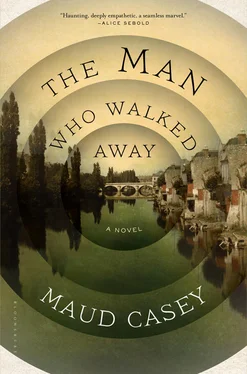Click-clickety-click. There are questions that remain to be answered — those four years, how did his father keep him from wandering? There is time enough, his own father said, and now the Director reminds him too. There is no rush, and there has been progress. “Look at him,” Nurse Anne said yesterday. There was Albert explaining to Elizabeth how he almost rode the funicular in Lyon. “I always wanted to be that sort of man,” he was saying. He is no longer a man comprised only of questions and blanks. Something in Albert’s face has changed — no longer always a question. Am I this man ? Occasionally, there was a flicker of conviction. I am this man.
The sun is up, time for the Doctor to go to work. Click-clickety-click. He pedals faster, eager to return to Albert, to continue with the case study he has been fiddling with in his notebook.
It all began one morning when a young man of twenty came from a long journey on foot and was exhausted, but that was not the cause of his tears. He wept because he could not prevent himself from departing on a trip when the need took him; he deserted work, and daily life, to walk as fast as he could, straight ahead, sometimes doing 70 kilometers a day on foot, until in the end he would be arrested for vagrancy and thrown in prison. According to the patient’s accounts, the spells of wandering began seven years ago. The patient’s father managed to prevent the wandering for four years, but the spells resumed when the patient was seventeen. When he wanders, he is not entirely awake, and when he arrives in another city or another country altogether, he isn’t sure where he is or how he got there. .
The Doctor’s bicycle wobbles; he is much improved, but he will never be a great Léotard. The chaos of gas contained in a perfectly fitted pipe . Something Albert’s father said to Albert when he told him the story of the accident that scarred his face. This is what the Doctor is trying to do — diagnoses are the fitted pipes that contained the unruly, combustible lives, the chaos between the there of before and the here of after. But it doesn’t end with the diagnosis. Fugueur . It is helpful, but it can’t hold an entire life. Albert’s father taught his son well. A diagnosis is a story like any other, an effort to explain. There is no rush.
And why not slow down? The Doctor still needs to look ten meters in front of him — and never at the road — to keep himself steady. Why not slow down and appreciate the beauty of this morning — the rag merchant waving goodbye, the sleeping geese, the quacking ducks? The trees, they took fantastic shapes . To be astonished by the world — Albert’s walking has come at a cost, but there is pleasure in his system.
Click-clickety-click, the Doctor pedals past the rows of silent houses shuttered to the wind carrying the eggy smell up from the smoke-spewing gasworks, past the statue of Diana still dragging the fallen stag, past the statue dedicated to the soldiers who die and die and die for their country, through the pushing morning crowd, the merchants and their carts, the narrow streets, past the stony justices who continue to glare, but so what? The Doctor is a man of blood and muscle, miraculously moving through these unchanging edifices. And? He is movement. So? He is progress. Now and now and click-clickety-click.
Once he is through the iron gates, the rushing world will fall away, as if it were the fleetingly improvised concoction Walter believes it to be — a scuffle in the public square as a man seeking justice for his nephew grabs the collar of a lawyer, threatening him with a different kind of justice; a woman calling after her friend, “Wait, there is one last thing. .”; a near-collision of two carriages in the narrow streets, the shrill whinny of a horse and a driver’s cursing.
Outside the small stone church, the witchy woman has resumed her watch. “See?” she says, shaking her head, as he rolls his bicycle through the iron gates. “Always on the run.”
“Good morning,” he says. He will not defend himself. He is fleeing to not fleeing from.
In the common room, there is the little world to which he has grown accustomed — Walter standing near Marian curled into an armchair, once again exhausted by her vigilance; Samuel, who has shed his large coat, as he has started to do recently with the encouragement of Henri, sits by the fire the Director is stoking. “The fire has nice, sharp edges,” Samuel says, though he trembles.
“I realize now what’s happened,” Walter is saying. “There’s been a mistake in the calculation.”
“Darling,” Marian says, “I am too hungry to listen to your calculations.”
“A mistake in the calculation is exactly why we have not eaten our breakfast.”
There is Albert speaking quietly to Elizabeth about a town he passed through as if he were a flâneur recounting his travels, “a town whose fragrance I never forgot. They manufactured rosewater there.”
“Water made of roses,” Elizabeth says, considering.
“Good morning, Elizabeth,” the Doctor says, putting a hand on Albert’s shoulder. “Good morning, Albert, you look well.” He does — so neatly dressed, with his mustache trimmed, and that look of gratitude the Doctor has been anticipating all morning.
It is only when Samuel says, “In death too, no music,” that the Doctor realizes what is missing. There is no music. Rachel is not at her usual place at the piano.
“No one has died,” says the Director, standing to examine the fire. “We are simply waiting for breakfast to begin. Look how lovely this fire is.”
Before the Doctor has a chance to inquire about Rachel, about the breakfast that has not yet been served, or to wonder where the veteran is, or Nurse Anne, or Henri and Claude, for that matter, there is a sound starker than the muted ringing of the bell when the wind is trapped in the tower. Howling, wild, it isn’t the wind.
A cry traveling up from the muddy, cold depths of the earth, it is the sound a man makes when the dead brother he abandoned on the battlefield returns to demand retribution. Only the veteran understands the force he has summoned. Standing in the billiard room, he beckons the darkness out of the pockets in the table: Brother, oh, my brother, there is a deserter among us, but it is not the man I accused. It is me . Only he understands he is to blame. For the others, the sound coming unwittingly out of the veteran’s mouth is the sound of their own singular terror.
“He is here!” Marian shouts, leaping from her chair, pushing Walter aside. “He is inside. It was him all along, the thief. Do you finally see?” She does. The tightness around her eyes is not the usual tightness of something missing; instead, it tugs like a question. Hadn’t she known this day would come? Hadn’t she sensed a shimmer taking shape after Albert arrived? But how could she know the sun would tuck itself inside him ? “It is in him,” she says, pointing at Albert.
But Walter thinks she means him. Or is, and this is far worse, Marian not real? After all this. It would be just like him to have attached himself to the least real of all. Once again, to have mistaken the portrait for the real woman. His dream of the other night was true after all, a world in which there were only reflections and he was the man walking away from a mirror, or was the reflection walking away from the man?
Down the hall in the women’s ward, the wind bangs a door, open and shut, open and shut, open and shut. Rachel lies in her bed, listening to the wind and the shapeless sound of anguish. It is the sound of her frog; he is finally dying. He was sick this morning. He did not want her to get out of bed and Nurse Anne finally threw up her hands. “I’m not spending my morning arguing with a frog.” How would she feel if her life was arguing with a frog? How would she feel if that argument that was her life was now draining from her? Tomorrow will bring a new day . Nurse Anne’s words linger, a mockery, as Rachel’s frog, the fiery braveness in her belly, goes as still as her mother’s hands when the music should have filled her. Why hadn’t it filled her? Why wasn’t the music filling Rachel now? Tomorrow will bring a new day. Tomorrow will bring a new day . Must there be a new day? Why not let her become the ghost she’s always known herself to be?
Читать дальше












